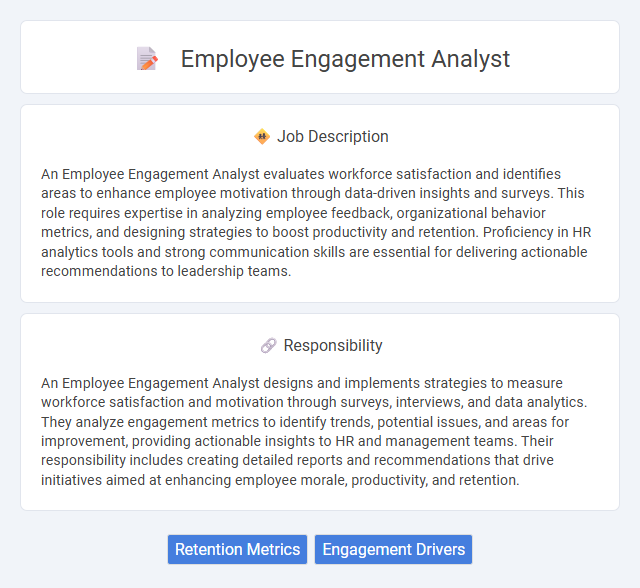
An Employee Engagement Analyst evaluates workforce satisfaction and identifies areas to enhance employee motivation through data-driven insights and surveys. This role requires expertise in analyzing employee feedback, organizational behavior metrics, and designing strategies to boost productivity and retention. Proficiency in HR analytics tools and strong communication skills are essential for delivering actionable recommendations to leadership teams.
Individuals with strong interpersonal skills and a keen interest in understanding workplace dynamics will likely be suitable for the role of Employee Engagement Analyst. Those who are comfortable analyzing data and translating it into actionable insights may thrive in this position. People who prefer routine tasks without much interaction might find this job less fitting.
Qualification
An Employee Engagement Analyst typically requires a bachelor's degree in Human Resources, Business Administration, or Psychology, with proven experience in data analysis and survey design. Proficiency in HR analytics tools, statistical software, and strong communication skills are essential for interpreting data and delivering actionable insights to improve workplace morale. Expertise in organizational behavior and stakeholder management enhances the ability to drive strategic initiatives that boost employee satisfaction and retention.
Responsibility
An Employee Engagement Analyst designs and implements strategies to measure workforce satisfaction and motivation through surveys, interviews, and data analytics. They analyze engagement metrics to identify trends, potential issues, and areas for improvement, providing actionable insights to HR and management teams. Their responsibility includes creating detailed reports and recommendations that drive initiatives aimed at enhancing employee morale, productivity, and retention.
Benefit
An Employee Engagement Analyst likely improves workplace productivity by identifying factors that boost employee satisfaction and morale. Their insights probably lead to reduced turnover rates and higher retention, which benefits organizational stability and growth. Companies may experience enhanced team collaboration and a more positive corporate culture as a result of their analysis.
Challenge
The role of an Employee Engagement Analyst likely involves the challenge of accurately measuring and interpreting employee sentiment across diverse departments, which may require navigating complex organizational dynamics. There is a probability that the analyst must design innovative surveys and feedback mechanisms to capture genuine insights while overcoming potential biases. Effective communication of findings to leadership could also present difficulties, as it requires translating data into actionable strategies that resonate across various stakeholders.
Career Advancement
An Employee Engagement Analyst plays a crucial role in assessing workplace culture and measuring employee satisfaction through data analysis and survey implementation. Mastery in data interpretation, communication skills, and familiarity with HR technologies can lead to career advancement opportunities such as HR Business Partner or Talent Management Specialist. Continuous development in organizational psychology and change management further enhances prospects for leadership positions in human capital management.
Key Terms
Retention Metrics
Employee Engagement Analysts specialize in analyzing retention metrics to uncover patterns related to employee turnover and satisfaction. By tracking key indicators such as attrition rates, employee feedback scores, and tenure data, they help organizations develop targeted strategies to improve retention. Their insights enable companies to reduce costs associated with turnover and enhance overall workforce stability.
Engagement Drivers
An Employee Engagement Analyst specializes in identifying and measuring key engagement drivers such as leadership communication, recognition programs, and work-life balance initiatives. By leveraging data analytics and employee feedback surveys, they uncover patterns that influence job satisfaction and productivity. Their insights guide strategic interventions to improve retention rates and foster a positive organizational culture.
 kuljobs.com
kuljobs.com